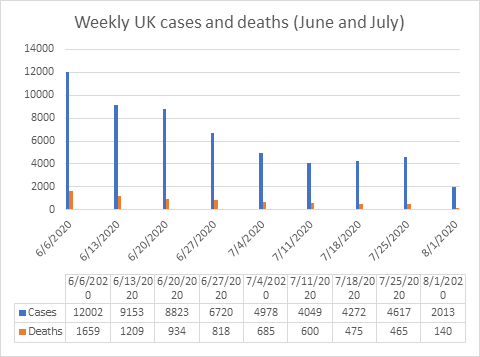This is the nineteenth of a series of bulletins produced by ISE to update members on key data and policy on Covid-19. This bulletin focuses on the period 23/07/2020-29/07/2020.
You can access all of the Covid-19 bulletins on the ISE website.
Latest Covid-19 data

Data taken from Wikipedia and from the government’s Number of coronavirus (Covid-19) cases and risk in the UK webpage. This week we are reporting the weekly number of cases and deaths as this shows that the decline in the disease has started to level out over the last three weeks. The data for the week 26 July – 1 August is still incomplete.
- The UK currently has reported a total of 301,455 cases and 45,961 deaths.
- Health leaders call for the government to adopt a ‘zero Covid’ approach.
- The World Health Organisation reports that Covid-19 cases are still accelerating worldwide.
- Argument continues about when and if a second wave is coming. Some commentators argue that the idea of ‘waves’ is not that helpful in understanding the process of the disease.
Ending lockdown
- People are starting to return to offices and other workplaces, but many report some anxiety in making this move.
Education
- Teachers report concerns about the start of term. Unions call for teachers to be able to wear facemasks.
- The government’s SAGE committee offers advice to universities on reopening campuses.
- Universities and candidates are poised for the start of the clearing process. There are some indications that the current situation puts more power in the hands of students.
- Supporting student mental health on campus (ISE blog from Rachael Collins)
- The government still has big questions to answer about its career guidance policy argues Tristram Hooley.
Economy
- Economic recovery has been slow and uneven although there are also some positive signs from the high street. A report from EY says it may take until 2024 for the economy to fully recover.
- As the furlough scheme comes to an end there is concern about the impact of a sudden end on unemployment. The think tank NEISR and some political leaders are calling for the scheme to be extended. Research from IFF suggests that the Job Retention Bonus is unlikely to drive employer behaviour.
- Competition is high in the labour market with reports of a 1000 people applying for a receptionist job in Manchester and wider reports of high numbers of applications for new jobs.
- Covid-19 has created particular challenges for self-employed women argues Professor Julia Rouse.
- Unemployment continues to grow. The Institute of Employment Studies report that there are eight people unemployed for every vacancy. Geography appears to be structuring unemployment with areas that are reliant on tourism particularly badly hit as well as concerns about the situation in London.
The student labour market
- New research from Sutton Trust suggests that entry-level recruitment is down with worrying impacts on social mobility.
- Global careering in a post-Covid world (Blog from Tristram Hooley on Luminate).
- UK graduate labour market update from Charlie Ball.
- The labour market appears to be strongest for graduates in health related disciplines.
- Early careers candidate experience in a crisis and beyond (ISE webinar)
- All you need to know about university led virtual careers fairs (ISE webinar)
Was this article helpful?
YesNo


0 Comments